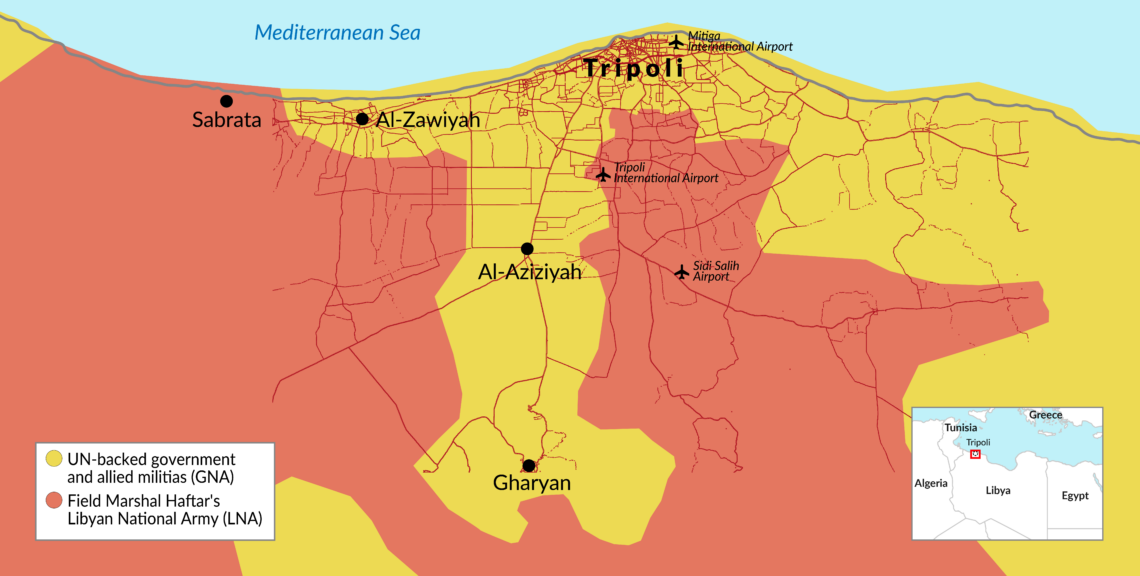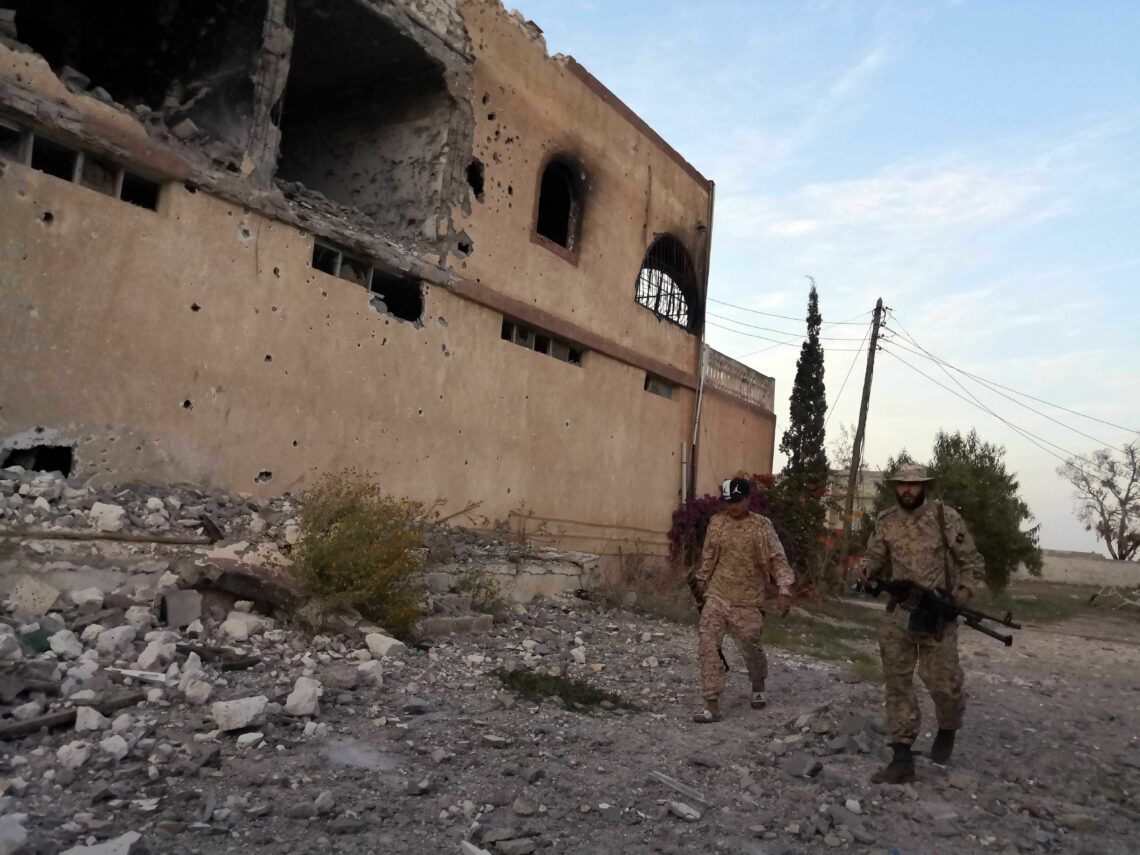Beyond the siege of Tripoli
With the international community paralyzed by political strife, the Libyan conflict appears set to intensify in the weeks ahead. If the Libyan National Army extends its siege of Tripoli, the ensuing fight will be incomparably more brutal than previous battles.

In a nutshell
- The Libyan National Army has begun to strike urban areas in the capital
- Field Marshal Haftar and his army are relying heavily on Russian mercenaries
- Turkish support can still tip the scales in favor of the Government of National Accord
Until recently, most of the war in Libya took place in deserts and agricultural fields, only rarely reaching cities like Tarhuna and Gharyan. Now, after weeks of stalemate, the conflict has begun to rage at the doorstep of the capital, Tripoli. If the fight comes to fully urbanized areas, a completely new type of warfare will result.
Realism in Rome
This past October, Russian Foreign Minister Sergei Lavrov said that Libya, given the institutional vacuum, was going to become the “main terrorist hub in North Africa where this disease [terrorism] may spread into other countries and continents.”
In December 2019, at the Mediterranean Dialogues Conference in Rome, Mr. Lavrov also questioned whether the next conference on Libya, scheduled to take place in Berlin next year, should be held under the current circumstances. He emphasized that Fayez al-Sarraj, Prime Minister of the Government of National Accord (GNA), and Field Marshal Khalifa Haftar, leader of the Libyan National Army (LNA), have agreed on paper to the creation of a new Presidential Council and constitution, and on how to divide oil incomes. The underlying implication of Minister Lavrov’s remarks was that, since none of these steps have materialized, another conference would be a waste of time.
He also made another revealing statement: “We have learned from the past years that we can only rely on ourselves because our Western partners are not reliable partners.” This denotes a realistic approach, in comparison to the sometimes idealistic American perspective. But his words could also lead to an escalation of the conflict.
The Libyan conflict is a peculiar war, where the two contingents comprise only a few thousand men.
Finally, when Minister Lavrov was questioned about the presence of Russian mercenaries fighting in the LNA, he answered by underlining that NATO has soldiers in many areas of the globe – a matter that had not been raised in the discussion so far. He concluded by adding that the best course of action would be to return to the Abu Dhabi agreements, where Field Marshal Haftar and Prime Minister al-Sarraj consented to hold elections, and implement them.
Meanwhile, also at the Mediterranean Dialogues Conference, the Special Representative and Head of the United Nations Support Mission in Libya (UNSMIL), Ghassan Salame, described the difficult reality on the ground. He spoke of his profound disappointment over the fact the Field Marshal Haftar renewed hostilities a mere 10 days before the Libyan National Conference could start in Ghadames in April 2019. The conference was meant to allow more than a hundred Libyans from various groups to discuss elections and an eventual peace process.
Mr. Salame also highlighted a sharp deterioration of the situation because of the increased use of drones on both sides. It is worth noting that the Libyan conflict is a peculiar war, where the two contingents comprise only a few thousand men, plus mercenaries mostly hired by the LNA. Until now, it is estimated that the GNA has carried out 270 drone missions, compared to 800 for the LNA.
Russian and Turkish footprints
At the beginning of the siege of Tripoli, the city itself was not targeted, but as of December 2019 attacks have moved to urban areas. The fight has been driven by Russian mercenaries – no matter what Mr. Lavrov claims. The GNA is creating a list of names of the 600-1,400 Russian fighters on the ground to present to Moscow. The Russian fighters have the expertise and new weapons, and they are ruthless. Meanwhile, there are rumors that a new shipment of weapons from Turkey for the GNA is scheduled to land in Tripoli shortly.
Unless Turkey decides to intensify its involvement, militias in Tripoli are facing several grim weeks.
On November 27, the GNA and Ankara signed an important agreement on maritime boundaries between the two countries in an area historically claimed by Turkey and Cyprus. The new borders are located near the Greek island of Crete, and could easily jeopardize Athens’ plan to build a gas pipeline from the Eastern Mediterranean to Europe. Obviously, many have questioned the validity of the document since the GNA is so weak, and because Greece could strike a similar deal with Field Marshal Haftar. But the agreement does shed a certain light on the imminent Turkish shipment of arms to Tripoli.
Unless Turkey decides to intensify its involvement, militias in Tripoli are facing several grim weeks. Armed conflict on crowded streets is a completely different matter than fighting in rural areas. Casualties, including civilians, and destruction will grow exponentially.
Until now, deep divisions within the international community have prevented the effective imposition of a cease-fire. The United Nations Security Council has met 15 times since the beginning of this war, but to no avail, absurdly enough. External interference increased despite the arms embargo.

For this reason, UNSMIL Special Envoy Salame had to radically change his strategy, which had been focusing on domestic issues for the previous 18 months. He requested a short truce and attempted to win over the five members of the Security Council to find common ground on which every international actor could agree. The next step would be a Libyan-Libyan dialogue without foreign actors. A follow-up committee would monitor the cease-fire through intelligence and control on the ground, without the use of UN forces.
The Libyan case clearly shows the extreme polarization of the international community over existing conflicts, from Syria to Yemen, from Iran to Iraq – a deeply dysfunctional situation.
Scenarios
1) Field Marshal Haftar intensifies the siege, breaks the first perimeter of the city with the help of drones, as well as Russian and Sudanese mercenary forces
At the moment, this is the most probable scenario. If Field Marshal Haftar leads his forces into the city, there will be carnage, at least in the first days of combat. Tripoli militias are fighting for their city and their families, but the mercenaries will have the majority. The poor training of LNA troops has been clear since the early days of the conflict. Given the high level of risk involved in fighting on the streets, it is likely that the dirty work will be done largely by others. This will also increase ruthlessness on the battlefield. After some time, part of the GNA militia could pass over to the enemy and surrender, handing the city over to the new dictator.
2) Field Marshal Haftar is blocked by Tripoli militias, who manage to hold the capital with help from Misrata militias and Ankara
This scenario is also likely, but strongly depends on an agreement between Ankara and Moscow. With Turkish supplies of drones and armored vehicles, the dynamics of the siege could undergo a radical change, but not without bloodshed. The death toll will be high, especially among civilians. However, the intervention of the Turks and the Misratans could block the advance of the LNA and make it retreat. Such a development could mean the end of Field Marshal Haftar and his hegemonic aims.
3) Thanks to the extraordinary efforts of Ghassan Salame, the international community, but above all Russia and the United States of America, agree on a common strategy to manage the crisis
This scenario, in which the conflict is resolved through political and diplomatic means, is the least plausible. Many foreign politicians have emphasized that the only solution to this conflict is political, rather than military. Unfortunately, at this point, the former seems nearly impossible.
The two main protagonists, Prime Minister al-Sarraj and Field Marshal Haftar, do not trust each other and will not consent to any mediation, making a political resolution impossible until one of them is removed. Prime Minister al-Sarraj has made it clear since the beginning of the conflict on April 4, 2019 that he will never return to the negotiating table with Field Marshal Haftar who, for his part, considers the GNA prime minister a weak political element hostage to Islamist militias.
It is becoming increasingly clear that the outcome of the Libyan conflict will be neither quick nor painless.








